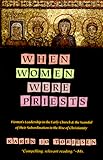Originally written in the late ’90s regarding the reading list of a truly fascinating anthropology class. The papers are extremely light — basically just some quick review and discussion questions. I include them here mostly because the books were excellent and well worth reading for thoughtful perspectives on women’s roles in a variety of religions.
Women’s Rebellion & Islamic Memory
by Fatima Mernissi
This week’s readings covered Women’s Rebellion & Islamic Memory. Mernissi recognizes and clearly states some of the problems that today face the Islamic Arab nations in their attempts to become full, contributing members of the world community. She does so by reprinting various essays she’s written over approximately a decade.
In the essays she does an excellent job of ‘constructive’ critique; she identifies the problem, as well as the historical reasoning behind its existence, then gives concrete, useful, and realizable suggestions to correct the problem. Unfortunately, although I looked, I did not find much in the way of her recognition of public (as opposed to personal) progress made. Thus, overall, I’d have to say this was a rather sad book.
I think, if I were to ask a question in class about this reading, I’d have to ask the same question Mernissi herself asks in her essay Women’s Work, “Why do we remain limited to sex-role models that are heavily dependent upon our medieval past, instead of creating ones that would help us dynamize our perceptions of ourselves as sexual beings? (73)”
This is as pertinent a question for American women today as it is for Mernissi’s countrywomen. Consider: like Islam, modern-day Christianity is based more upon medieval interpretations of women as second-class citizens (when they are even considered individuals rather than property) than the actual words and teachings of their main prophet.
When will women decide the medieval mindset is simply not applicable to modern-day politics? When will we refuse the concept of woman/sexuality as being synonymous with lawlessness/evil? And finally, when will all of us realize that a society based on the oppression of a portion of its members is a society where none are truly free?
Other Excellent & Recommended Books from this Course
 Fundamentalism and Gender
Fundamentalism and Gender
edited by John Stratton Hawley
 When Women Were Priests: Women’s Leadership in the Early Church and the Scandal of Their Subordination in the Rise of Christianity
When Women Were Priests: Women’s Leadership in the Early Church and the Scandal of Their Subordination in the Rise of Christianity
by Karen Jo Torjesen

